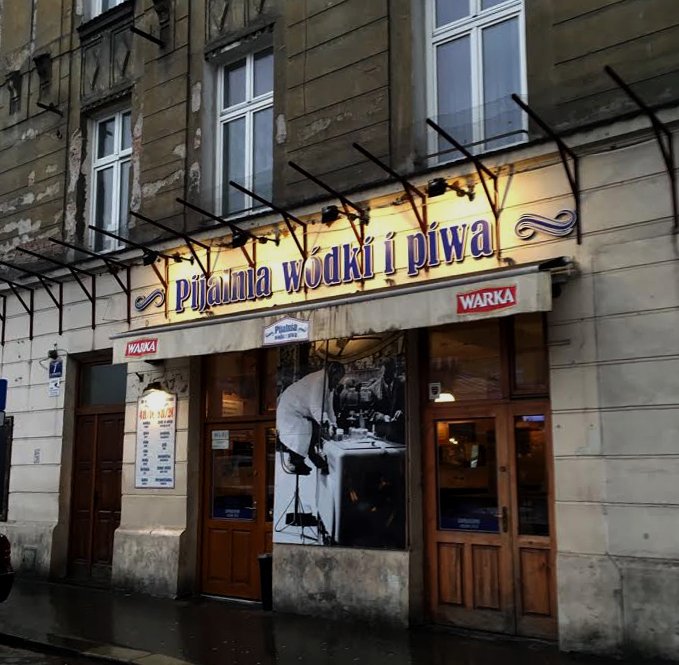
Cheap Booze and Communist Nostalgia Are Always a Winning Formula

Cheap Booze and Communist Nostalgia Are Always a Winning Formula
Beer and Shots in Poland
Entering Katowice at night gives the weird, off-kilter feeling of a nightmare. The downtown is empty, windows all shuttered, and medieval streets zigzag around lurking industrial buildings. It’s unsettling, unwelcoming—but we knew exactly where to go for a drink.
Anders and I had discovered it while lost in Warsaw, the first city on our haphazard cultural tour of Poland. In the dead of winter, this tacky-looking dive bar shone out at us from a side street. Anders translated Pijalnia Wódki i Piwa to “Pumproom of Vodka and Beer.”
The whole city was represented inside: students and bankers and resident drunks together. Drinks cost four zloty and meals to buffer consumption were eight. It was decked out in a jaunty Age-of-Communism theme, with a smiling drunk for a mascot and Polish blues hits coming through the speakers. These proudly dingy bars, offering a winning formula of cheap booze and snacks and communist nostalgia, are a growing franchise across Poland.
It was a harsh ride to Wroclaw the next morning. Old friends of Anders’ were showing us the town when, among the fake Irish pubs of the main square, we spotted something familiar. Pijalnia was shining like a Christmas gingerbread house to us, just as boisterous, just as twee. Our exploration of Wroclaw ended there, in a raucous night.
Arriving in stark Katowice on a Sunday, we knew what to look for.
Its Pijalnia was located in an empty cobblestone market row. The sky above had an eerie yellow glow from the lights of steel mills reflected onto clouds. We found our haven, and the night began as had all the others—casually.
When we started to get drunk we ordered dinner in coins. Of the four menu options, I went with the grey potato porridge (gzik), and Anders the wretched scoop of raw mincemeat with an egg cracked in it (tartare).
By 9 p.m. we were reeling, extolling the beauty of Katowice and the wonderful pragmatism of Polish drinking culture. We made a pact to open a Pijalnia in Sweden. We began to socialize. I remember setting down a shot glass and looking up at Anders, who was wolfing down tartare and shouting something in agreement with two harsh-looking bald men at the bar. They wore hideous smiles, and were offering us rounds of drinks for the honor of visiting their country. I felt the need to lurch home.
Anders nearly battered down the hotel room door five hours later. He was not lucid, but garbled something about being offered to go to a disco party, accepting, visiting a some kind of squat house, fearing abduction, and running through the streets of Katowice, eventually finding his way home via Pijalnia. I was glad that Katowice had turned out to be such an adventure.
We spent the next day sullen, in real pain on the PolskiBus coach to Krakow. It was a five-hour ride, including delays, but at six zloty per ticket we’d deemed it the only way to travel. PolskiBus is sort of the Pijalnia of long-distance public transport.
That evening, in the Pijalnia in Krakow’s Old Town, we were quiet. I sipped a fourth beer and stared into my gzik. The bartender turned up the blues.
“Too much Pijalnia,” I said to Anders.
“No,” he protested; and with longing eyes: “Pijalnia home.”
Pijalnia Wódki i Piwa
Mariacka 8, 40-014 Katowice, Poland